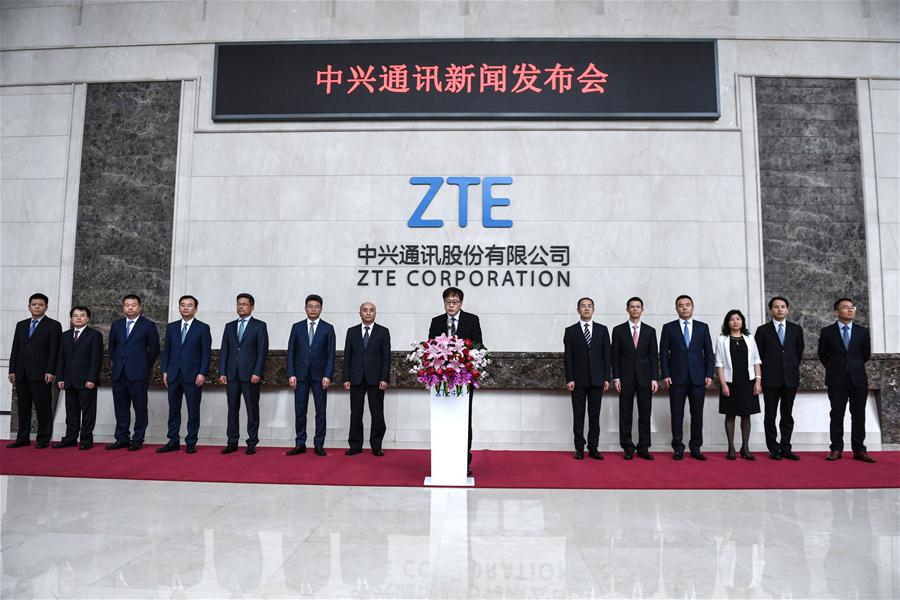
Chinese telecom equipment maker ZTE Corp. holds a press conference at its headquarters in Shenzhen, south China's Guangdong Province, April 20, 2018. (Xinhua/Mao Siqian)
SHENZHEN, April 20 (Xinhua) -- Chinese telecom equipment maker ZTE Corp. said in a statement on Friday that it will not accept a ban by the United States on the company, calling the decision "unfair."
"The ban will not only severely impact the survival and development of ZTE, but also cause damage to all partners of ZTE including a large number of U.S. companies," said the statement, which came after the U.S. Department of Commerce imposed a denial of export privileges against ZTE for alleged violations of the Export Administration Regulations earlier this week.
It is "unacceptable" that the U.S. side insists on unfairly imposing the most severe penalty against ZTE, even before the completion of an investigation, the statement said.
The U.S. side has disregarded the fact that ZTE has identified the issues itself and immediately reported them to the U.S. side, and that "the company has taken measures against the employees who might have been responsible for this incident," the statement said.
ZTE argued that "corrective measures" had been taken immediately and a U.S. law firm had been engaged to conduct an independent investigation before the U.S. decision was made.
Yin Yimin, chairman of ZTE, said at a press conference held on Friday afternoon that the company is firmly opposed to the U.S. ban, which is likely to put the company "in shock" and cause direct losses to its global clients, including carriers and consumers, and its shareholders.
ZTE said it has continuously reflected on lessons from its past experience in export control compliance and has attached great importance to the matter during the past two years.
"Within ZTE, compliance is regarded as the foundation and bottom-line of the company's operation," the statement said.
Its efforts included organizing compliance training for over 65,000 employees, as well as comprehensively cooperating with the U.S. side and providing over 132,000 pages of documents. In 2017, ZTE invested over 50million U.S. dollars in its export control compliance program and is planning to invest more resources in 2018, the statement said.
"The incident is a technology war in essence, and we should be alert that the United States will politicize economic frictions," economist Zhang Lianqi said.
The Shenzhen-based company said it is determined to take all judicial measures to safeguard its legal rights and interests, while it will not give up efforts to resolve the issue through communication.
China's Ministry of Commerce (MOC) said Thursday that the U.S. action against ZTE will damage itself. "The action targets China, however, it will ultimately undermine the United States itself," said MOC spokesperson Gao Feng.
Established in 1985, ZTE provides technology and products to clients in more than 160 countries and regions.
"Although ZTE cannot represent all Chinese manufacturers, it is also not an isolated case," Zhang said. "The plight of domestic chip making tells the state of the manufacturing sector -- big but not strong."
Domestic producers have yet to master some core technology and the production of key components, Ye Tianchun, head of the Chinese Academy of Sciences institute of microelectronics, said.
China has started to channel more energy into development of top-end semiconductors, a significant part of its broader manufacturing improvement plan.
The government expects local chips to take up 40 percent of the market in 2020 and 70 percent in 2025.
Progress has been made in closing the technological gap and chip makers attracted by the huge market potential are increasing their presence in China.
"China has seen fast development in fields including semiconductor and is expected to fix the weaknesses and squeeze into the first echelon in the next 10 to 20 years," said Zhang Ping of Beijing University of Posts and Telecommunications.
ZTE will increase R&D investment, Yin said. "It's better to rely on oneself than to seek help from others," he said.















